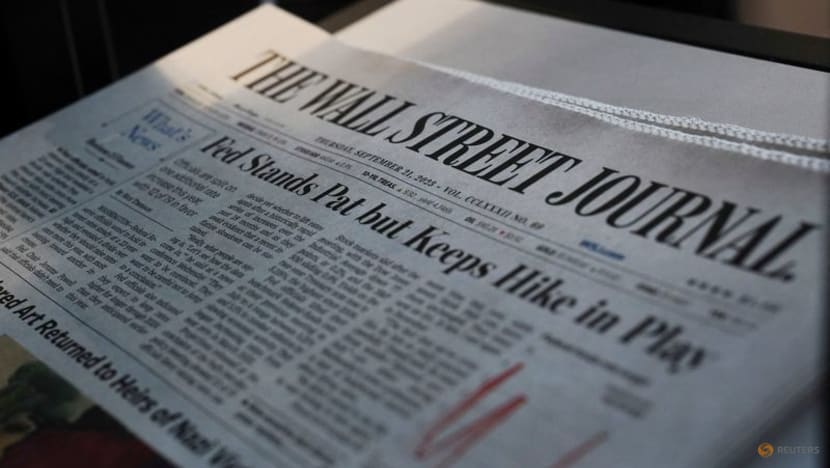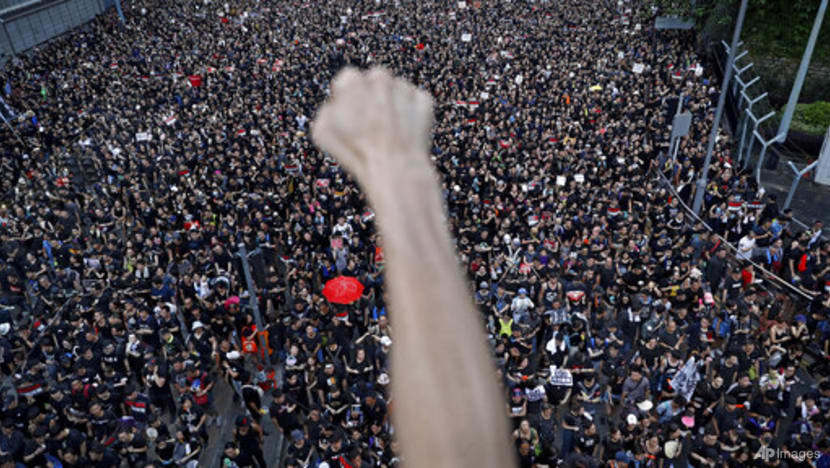Commentary: The Wall Street Journal’s move from Hong Kong is an attractive prize for Singapore - but what gives?
Having foreign media based in Singapore is an attractive prize for the authorities, conferring bragging rights that even a venerable defender of press freedom finds the city a suitable place to operate in, says former veteran newspaper editor Han Fook Kwang.


This audio is generated by an AI tool.
SINGAPORE: The Wall Street Journal’s recent announcement that it will move its Asia headquarters from Hong Kong to Singapore says as much about the Chinese city as it does the island republic.
Hong Kong and Singapore have traditionally been viewed as rival cities, two thriving financial centres attracting international companies and talented people to work and live there.
But recent political developments in China and Hong Kong have recast the latter’s image and raised questions about its future role.
The One Country, Two Systems philosophy that originally shaped the city’s development after its handover to the mainland in 1997 has been tested to a degree not envisaged earlier.
Chinese authorities have tightened control after the tumultuous events of 2019 which resulted in widespread violent protests culminating in the assault on the legislative building.
New national security laws were introduced earlier this year redefining what constituted treason and sedition and bringing Hongkongers closer to how these regulations apply to other Chinese cities.
Critics say the new rules expose foreign companies and their executives to stringent controls in a regime very different from what Hongkongers were used to previously as one of the freest economies in the world.
Chinese and Hong Kong officials argue that every country in the world including liberal democracies such as the United States and the United Kingdom enact such laws to safeguard their interests. To criticise Hong Kong’s version of these laws is disingenuous and reveals their prejudice and ill-will towards the city, they maintain.

A HOME TO MULTINATIONALS
Whether the fears are real or imagined, the fact is that more foreign companies and their nationals are leaving Hong Kong with a significant proportion making Singapore their base.
A Bloomberg report in February put it this way: “Hong Kong has lost the race to be international business' preferred choice for Asia headquarters, as more global and even Chinese companies choose Singapore because of its better relations with the West, broader talent pool, diversified economy, and tax incentives.”
It noted that Singapore is regional headquarters to 4,200 multinational companies in 2023, compared to 1,336 in Hong Kong.
Even Chinese companies have followed suit, reported the Financial Times in 2022.
It said that as many as 500 Chinese companies had quietly redomiciled or registered their businesses in Singapore over the past one year “in a bid to hedge against rising geopolitical risks as tensions between Beijing and Washington escalate.”
Many of these corporations operate in overseas markets and know the value of being marketed as international companies when they are headquartered or even listed in Singapore.
The Wall Street Journal's move to the island republic can be seen as part of this larger wave. But the relocation is also more complicated and different because it is an established American media company and not just another business entity.
SINGAPORE'S MEDIA LANDSCAPE
Why move to Singapore which is known for its strict media laws and sensitivity to foreign interference in its domestic politics?
The Wall Street Journal itself fell afoul of this in 1987 when circulation of its Asian edition was curtailed by the Singapore government to 400 copies after it refused to publish in full the authorities' reply to an article on the local stock market.
Several other publications including the International Herald Tribune, The Economist and Time magazine have been similarly dealt with in the past.
Given this history, it is understandable why Western media companies might be wary of operating here.
Their editorial approach on reporting news and commentaries sits uncomfortably with Singapore’s position which is that foreigners, including foreign media, have no right participating in local politics which is the preserve of Singaporeans.
What this means is that while foreign publications are free to publish for an international audience, they are deemed to be engaging in domestic politics when their articles comment on Singapore issues and are targeted at the local population.
The Newspaper and Printing Presses Act forbids such participation.
Lest anyone believes that the issue is no longer alive - the last time the government acted against a foreign publication was in the early 2000s - Law and Home Affairs Minister K Shanmugam’s widely publicised remarks against an Economist article last month should put everyone on notice that the authorities here are as watchful as ever on the media front.
Though no legal action was taken, his sharp rebuke of the magazine’s commentary on the recent leadership transition was clearly a shot over the journalistic bow.
BRAGGING RIGHTS
The Wall Street Journal is no stranger to crossing swords with governments on this front.
In 2020, three of its journalists in Beijing were expelled over the publication of an opinion piece in the paper.
It was the first time China had acted against multiple reporters from one news organisation since the country opened up its economy in the 1980s.
For Singapore, the balancing act continues as it seeks to be an attractive place for business and talent but to guard against unwanted outside influence.
Foreign companies, including media, will be wooed but protective legislation and constant vigilance will continue to be the order of the day.
Large inflows of foreign funds cause asset inflation - in property and car prices, for example - and immigration is always a hot political potato.
The recent multi-billion-dollar money laundering case is a prime reminder that maintaining this balance will be a perennial challenge.
Having foreign media based in Singapore is an attractive prize for the authorities, conferring bragging rights that even a venerable defender of press freedom finds the city a suitable place to operate in.
On this front, nothing has changed.
When founding Prime Minister Lee Kuan Yew spoke at the Hong Kong Foreign Correspondents’ Club in 1990 to a largely expatriate audience of journalists, he noted: “Hong Kong has provided them (expatriate journalists) with a perch from which to watch events in Asia and to comment on them with that ineffable air of sublime confidence. It is the only place in Asia where the white man still rules. Such a perch is not replaceable.
“All the alternatives, Tokyo, Seoul, Taipei, Manila, Bangkok, Kuala Lumpur or Jakarta do not offer the same congenial ambience for expatriates.
If I am right about this, then you should not rule out Singapore. For come 1997, Singapore will look somewhat different from the orderly but sterile, efficient but dull and authoritarian place it has been made out to be.”
The sales pitch was made more than 30 years ago and the Wall Street Journal’s move here might count as one more catch in the bag, if somewhat belated.
Han Fook Kwang was a veteran newspaper editor and is a senior fellow at the S Rajaratnam School of International Studies, Nanyang Technological University.


















